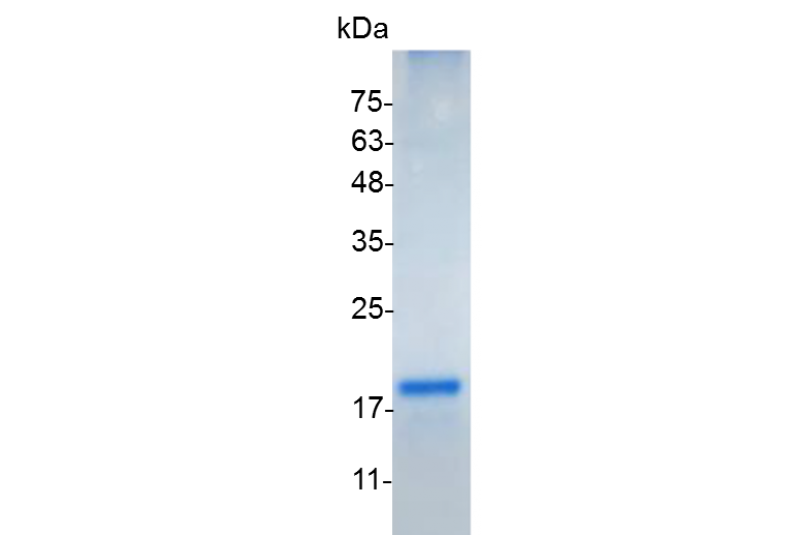FasL (Fas ligand), Mouse
FasL is a member of the TNF superfamily, and is mainly expressed on the cell surface of activated T cells. FasL induces apoptosis in Fas-bearing cells by binding to Fas Receptor. FasL has the ability to leads to down-regulation of the immune response through killing T cells and activated B cells. The mechanism of Fas-induced apoptosis involves recruitment of pro-caspase 8 through an adaptor molecule called FADD, followed by processing of the pro-enzyme into active forms. These active caspases then cleave various cellular substrates, leading to the eventual cell death.
Sequence:
QIANPSTPSEKKEPRSVAHLTGNPHSRSIPLEWEDTYGTALISGVKYKKGGLVINETGLYFVYSKVYFRGQSCNNQPLNHKVYMRNSKYPEDL
VLMEEKRLNYCTTGQIWAHSSYLGAVFNLTSADHLYVNISQLSLINFEESKTFFGLYKL with polyhistidine tag and sumo tag at the N-terminus
UnitProt ID:
P41047
Source:
Escherichia coli
Endotoxin Test:
<0.1 EU per 1 μg of the protein by the LAL method.
Activity:
Measure by its ability to induce apoptosis in Jurkat cells. The ED50 for this effect is <1 μg /mL.
Purity:
>98% as determined by SDS-PAGE analysis.
Form:
Lyophilized
Storage Buffer:
Lyophilized from a 0.2 μm filtered solution of PBS, pH 8.0.
Reconstitution:
It is recommended to reconstitute the lyophilized protein in sterile H2O to a concentration not less than 200 μg/mL and incubate the stock solution for at least 20 min to ensure sufficient re-dissolved.
Stability & Storage:
This product is stable after storage at:
• -20°C for 12 months in lyophilized state from date of receipt.
• -20°C or -80°C for 1 month under sterile conditions after reconstitution.
Avoid repeated freeze/thaw cycles.
Shipping Conditions:
Blue ice
QIANPSTPSEKKEPRSVAHLTGNPHSRSIPLEWEDTYGTALISGVKYKKGGLVINETGLYFVYSKVYFRGQSCNNQPLNHKVYMRNSKYPEDL
VLMEEKRLNYCTTGQIWAHSSYLGAVFNLTSADHLYVNISQLSLINFEESKTFFGLYKL with polyhistidine tag and sumo tag at the N-terminus
UnitProt ID:
P41047
Source:
Escherichia coli
Endotoxin Test:
<0.1 EU per 1 μg of the protein by the LAL method.
Activity:
Measure by its ability to induce apoptosis in Jurkat cells. The ED50 for this effect is <1 μg /mL.
Purity:
>98% as determined by SDS-PAGE analysis.
Form:
Lyophilized
Storage Buffer:
Lyophilized from a 0.2 μm filtered solution of PBS, pH 8.0.
Reconstitution:
It is recommended to reconstitute the lyophilized protein in sterile H2O to a concentration not less than 200 μg/mL and incubate the stock solution for at least 20 min to ensure sufficient re-dissolved.
Stability & Storage:
This product is stable after storage at:
• -20°C for 12 months in lyophilized state from date of receipt.
• -20°C or -80°C for 1 month under sterile conditions after reconstitution.
Avoid repeated freeze/thaw cycles.
Shipping Conditions:
Blue ice


